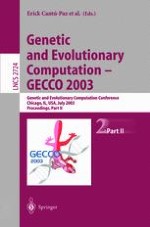2003 | OriginalPaper | Buchkapitel
Studying the Advantages of a Messy Evolutionary Algorithm for Natural Language Tagging
verfasst von : Lourdes Araujo
Erschienen in: Genetic and Evolutionary Computation — GECCO 2003
Verlag: Springer Berlin Heidelberg
Enthalten in: Professional Book Archive
Aktivieren Sie unsere intelligente Suche, um passende Fachinhalte oder Patente zu finden.
Wählen Sie Textabschnitte aus um mit Künstlicher Intelligenz passenden Patente zu finden. powered by
Markieren Sie Textabschnitte, um KI-gestützt weitere passende Inhalte zu finden. powered by
The process of labeling each word in a sentence with one of its lexical categories (noun, verb, etc) is called tagging and is a key step in parsing and many other language processing and generation applications. Automatic lexical taggers are usually based on statistical methods, such as Hidden Markov Models, which works with information extracted from large tagged available corpora. This information consists of the frequencies of the contexts of the words, that is, of the sequence of their neighbouring tags. Thus, these methods rely on the assumption that the tag of a word only depends on its surrounding tags. This work proposes the use of a Messy Evolutionary Algorithm to investigate the validity of this assumption. This algorithm is an extension of the fast messy genetic algorithms, a variety of Genetic Algorithms that improve the survival of high quality partial solutions or building blocks. Messy GAs do not require all genes to be present in the chromosomes and they may also appear more than one time. This allows us to study the kind of building blocks that arise, thus obtaining information of possible relationships between the tag of a word and other tags corresponding to any position in the sentence. The paper describes the design of a messy evolutionary algorithm for the tagging problem and a number of experiments on the performance of the system and the parameters of the algorithm.
